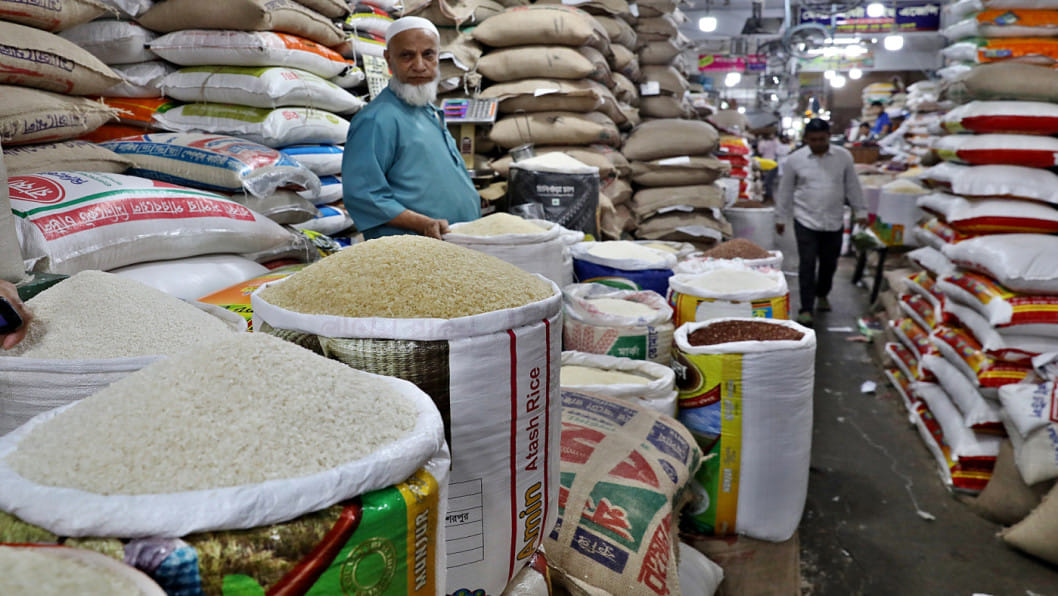277 firms allowed to import 14.81 lakh tonnes of rice

The interim government of Bangladesh has allowed 277 private entities to import 14.81 lakh tonnes of rice as it looks to contain domestic prices of the staple grain by increasing stocks.
Of the total, 10.65 lakh tonnes will be boiled rice while the rest will be sunned rice, according to documents of the food ministry.
Sunned rice, called "Atap chal" in Bangla, refers to grains that have been derived from paddy dried under the sun instead of being boiled.
The import permission was granted over the past couple of weeks.
Lutfor Rohman, joint secretary to the food ministry, told The Daily Star that the deadline for applying to import rice ended on November 17.
"Now, the government will let these 277 entities import rice in four phases. If necessary, permission will be given to import more rice based on the market situation," he said.
The retail price of rice has been rising ever since severe flooding across the country's northeastern region impacted Aman paddy cultivation in August.
So, to prevent further hikes in prices due to reduced yields of the country's second-largest rice crop, the interim government is trying to encourage imports and boost local stocks.
As per data of the Department of Agricultural Extension, two recent floods between August 16 to October 15 have disrupted the production of 8.39 lakh tonnes of rice.
At markets in Dhaka yesterday, fine rice was selling for Tk 68 to Tk 80 per kilogramme (kg) while medium grade rice was priced at Tk 59 to Tk 65 per kg.
Meanwhile, the cost of coarse rice was Tk 52 to Tk 55 per kg, according to data of the state-run Trading Corporation of Bangladesh (TCB).
The price of fine rice has increased by 2.78 percent over the past month, while that of medium grade rice by 6.90 percent and coarse rice by 1.90 percent.
In terms of annual growth, the price of fine rice has increased by 8.03 percent since 2023 while that of medium rice edged up by 12.73 percent and coarse rice by 4.90 percent.
Chitta Majumder, managing director of the Majumder Group of Industries, which imports rice from India apart from purchasing it from domestic sources for milling, said they got permission to import 80,000 tonnes of rice, and already have opened a letter of credit to import 2,000 tonnes of rice.
He said that the price of rice in the market declined when the imported rice started coming to the market.
The food ministry's directive regarding rice imports in the current phase requires the importers to market the rice all over the country by December 22.
In addition, information on the quantity of rice being imported and its storage and marketing must be conveyed to the district food controller. Furthermore, the importer cannot use the related import permit to import more rice than that allocated.
Lastly, the imported rice cannot be repackaged under the name of any other organisation, and it must be sold in imported sacks.
On October 29, the Bangladesh Trade and Tariff Commission (BTTC) requested the government to temporarily withdraw the import duty on rice to increase the supply and thereby contain prices.
Then on November 1, the National Board of Revenue decided to withdraw all import duties and issue a statutory regulatory order to this end.
According to the Bangladesh Bureau of Statistics (BBS), food inflation has remained above 10 percent for six consecutive months since April this year.
Low and middle-income earners in the country have been bearing the brunt of persistent inflation since March 2023, with overall inflation hovering above 9 percent.
In October this year, inflation hit a three-month high of 10.87 percent, driven by soaring food prices, particularly for rice and vegetables, the BBS data showed.
Bangladesh annually needs about 3.7 to 3.9 crore tonnes of rice, most of which are met through domestic production. Bangladesh did not import any rice in fiscal year 2023-24.

 For all latest news, follow The Daily Star's Google News channel.
For all latest news, follow The Daily Star's Google News channel. 



Comments